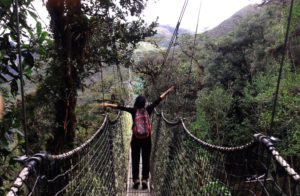HOLA! I’m Lucely Vilca Bustamante, I’m from Peru, specifically from the imperial city of Cusco.
Study Biology at Universidad San Antonio Abad del Cusco, take many courses in relation to
Ecology and Botany, since that is what interests me the most, collaborate as a field assistant
for some researchers who study the ecology of the different ecosystems that there is in Cusco
region, All this led me to learn and know a lot about the taxonomy of plants in that region. I
finished my career in August of last year, I am still a Bachelor.
Scientifically, I am interested in Ecology in relation to plants, especially in communities of
plants high Andean of paramo and puna and how these plants respond to global changes such
as global warming, climate change, loss biodiversity in relation to their distribution and human
impact.
The objectives that I would like to fulfill during the Course, first of all, is to better understand
Ecology with a focus on functional traits since it is a new subject for me. I am passionate about
the high-Andean flora in a taxonomic approach (including grassland) and to understand the
behavior of these with a trait approach, it obsesses me, for that reason another of my
objectives is to acquire skills in the measurement of functional traits of plants, to know much
more, about the methodologies applied, the use of the tools used in the course (especially the
licor in the measurement of gas flow), in addition to the analysis and interpretation of data. I
will know that I have met these goals when I feel capable of doing my own research (Pre-
graduate Thesis) based on Ecology with a focus on functional traits.
What most excites me about the course, is the focus of the functional traits applied in the
areas of paramo or puna and the response of this front to climate change (I find it very
interesting) at the same time that I am excited to learn, know and work with new people with
great experience from different parts of the world in one of the most diverse places in Peru.

With regard to climate change, most people in Peru have heard about it, but only a minority
understands it since the consequences constitute risks for sustainable development. Because
global projections are global, most Peruvians believe that climate change only occurs in
developed countries and, in addition, limitations in research and local scientific knowledge do
not help to understand that climate change affects everyone.
The majority of Peruvians do not differentiate global warming from climate change, but
associate believing that it is the same, at the same time they indicate that such warming is due
to human activities such as industry, but they are not aware that one same at home can be
part of this. Talk about climate change in Peru if it is a very controversial issue, due to the
different approaches and scarce analysis of the impacts of changes that most people handle.
As consequences, the frequency and intensity of known hazards increase in Peru as floods,
droughts, frosts, mass movements, friajes and hailstorms, as well as extreme phenomena of
climatic origin such as "El Niño y la Niña". In a country like Peru, with 28 of the 32 existing
climates in the world, the specific effects of climate change will vary both in the territory and
in time. Peru is a country highly vulnerable to climate change, due to the expected impacts on
ecosystems of global importance such as the Amazon and the Glaciers.